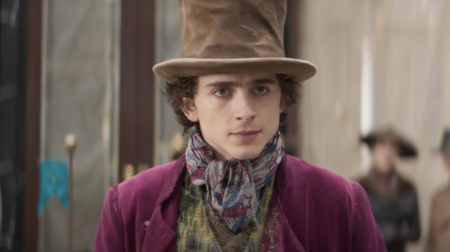'Wonka' review: Timothée Chalamet honors whimsical world of Roald Dahl in wholesome prequel

Willy Wonka, the iconic character from Roald Dahl's Charlie and the Chocolate Factory, is one of the most beloved characters in children’s fiction and film, brought to the big screen by Gene Wilder and Johnny Depp in 1971 and 2005, respectively.
But how did Willy Wonka become the quirky, colorful chocolatier with a penchant for everlasting gobstoppers and teaching children lessons about behavior, greed and humility?
"Wonka," starring Timothée Chalamet and directed by Paul King (the "Paddington" movies), tells the backstory and character development of Willy Wonka before he became the legendary candymaker known for his astonishing array of fantastical candies.
The film, hitting theaters Dec. 15, is a loving tribute to the whimsical and magical world Dahl created: a wholesome story filled with humor, heart and music. Through humor and dance numbers, it highlights the power of tenacity and kindness, even in the face of evil.
What's it about?
“Wonka” opens with a young Willy, who arrives in London after his adventures at sea. He’s determined to fulfill his promise to his mother (Sally Hawkins) to open a chocolate shop and use his wealth of confectionary knowledge.
However, his plans are complicated by financial struggles — he rapidly goes through his 12 sovereigns — and conflicts with a host of sinister individuals determined to foil his plans. These include the greedy Mrs. Scrubitt (Olivia Colman), who wants to keep him as an indentured servant of sorts, the menacing Chocolate Cartell, comprised of Slugworth (Paterson Joseph), Prodnose (Matt Lucas) and Fickelgruber (Mathew Baynton) and their gatekeepers, corrupt chocoholic clergy members and police. Complicating matters is a sullen Oompa Loopa (Hugh Grant), who keeps stealing Willy’s chocolate late at night, exacting revenge for the time the confectioner stole three cocoa beans from his island.
Not one to be deterred by seemingly impossible circumstances, Willy, aided by a young ally, Noodle (Calah Lane), concocts a plan to establish a secret candy store. Along with a band of quirky new friends, Willy works tirelessly to fulfill his dreams while dodging shady characters and elevating his friends in the process.
Woven throughout the brightly-colored story are rousing musical numbers, including the uplifting "For a Moment," the anthemic "A World of Your Own," and the jazzy "You’ve Never Had Chocolate Like This," featuring whimsical candy creations. The costumes are elaborate, and the set is detailed, making it a feast for the eyes.
Is it safe for families?
Rated PG, “Wonka” is notably devoid of foul language and sexual content. There is some slapstick violence, and the clergy in the film are portrayed as corrupt — the Chocolate Cartell pays them off in chocolate to keep their secrets in a safe underneath the cathedral. However, they are aware of their faults: “Forgive me, I am a sinner, a weak and wicked chocoholic,” one priest notably declares at the end.
There are plenty of sweet (if sometimes haphazard) subplots throughout the film, most notably the friendship between Noodle and Willy. Noodle teaches Willy to read, while the candymaker introduces the young girl to the life-changing world of chocolate and helps her escape her Oliver Twist-like surroundings in a decrepit laundromat.
Chalamet’s Wonka differs significantly from Gene Wilder’s darker, more sarcastic interpretation and Depp’s odd and off-putting version of the character. Fresh-faced and optimistic, he brings his own brand of earnest goodness to the role, elevating kindness and selflessness.
Though Dahl was not a Christian — he was known for his skepticism toward organized religion — he consistently promoted morality through his work. For example, characters who exhibit humility and kindness, like Charlie Bucket in Charlie and the Chocolate Factory, are rewarded, while those who are greedy, selfish or cruel face consequences (like being turned into a giant blueberry).
It’s this same spirit that permeates 2023's “Wonka.” Though Willie is repeatedly maligned, betrayed and swindled by a host of eccentric adversaries, he remains gentle, treating others with kindness and respect. Ultimately, the good guys win, and the bad guys lose; good triumphs over evil.
Overall, “Wonka” is a lighthearted, enjoyable adaptation that offers a musically vibrant experience for viewers. At a time when Hollywood seems particularly out of touch regarding the content families and children want to consume, “Wonka” serves as a sweet holiday escape the whole family can enjoy.
Leah M. Klett is a reporter for The Christian Post. She can be reached at: [email protected]





















